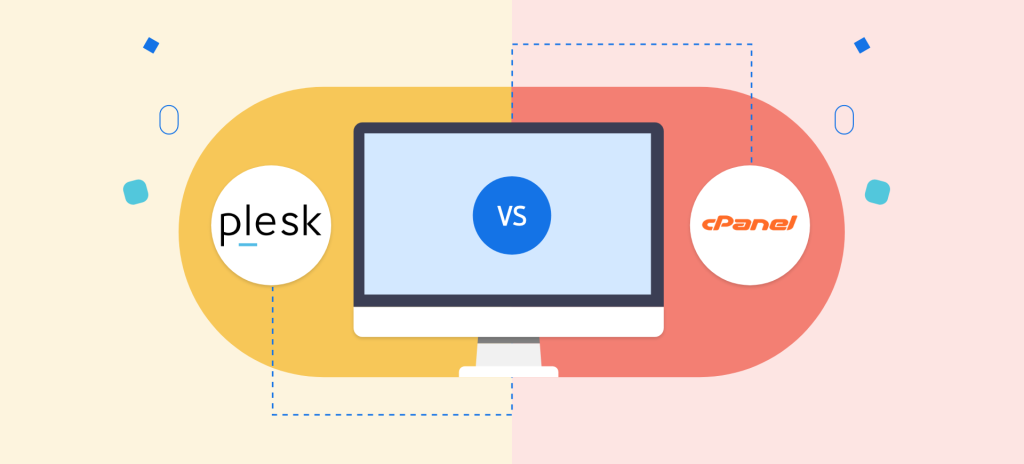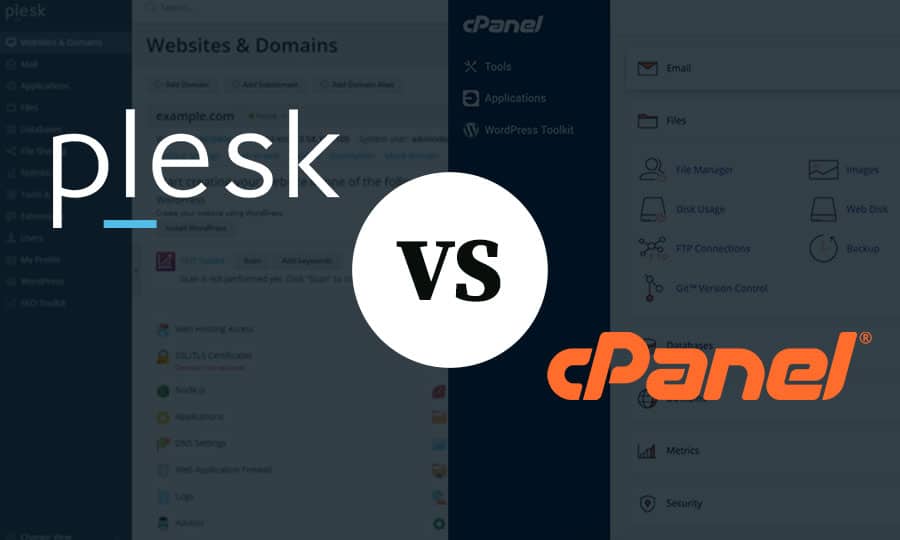Table of Contents
Introduction:
In the dynamic world of web hosting, the choice of a control panel can significantly impact the efficiency, management, and overall experience of hosting a website. Two prominent contenders in this arena are cPanel and Plesk. Both platforms offer robust features, intuitive interfaces, and automation tools designed to streamline website and server management. However, understanding the nuances and differences between these control panels is crucial for making an informed decision.
What is cPanel?

cPanel is a widely-used web hosting control panel that provides a graphical interface and automation tools designed to simplify the process of hosting a website. It offers a range of features that enable users to manage various aspects of their hosting environment without needing advanced technical knowledge.
cPanel is renowned for its user-friendly interface and comprehensive feature set tailored for Linux-based servers. With its intuitive layout and automation capabilities, cPanel simplifies tasks such as domain management, email configuration, file management, and more. Its extensive ecosystem of plugins and add-ons further enhances its functionality, making it a popular choice among hosting providers and users alike.
Here are some key aspects of cPanel:
- User Interface: cPanel provides an intuitive graphical user interface (GUI) that allows users to easily navigate and manage their hosting account. It offers a clean layout with categorized sections for different functions such as file management, domain management, email management, databases, security settings, and more.
- Functionality: cPanel offers a comprehensive set of tools and features to manage all aspects of web hosting. Users can create and manage email accounts, domains, subdomains, FTP accounts, databases (MySQL, PostgreSQL), file backups, SSL certificates, and more. It also includes tools for website statistics, error logging, and resource usage monitoring.
- Automation: cPanel automates many tasks associated with web hosting, making it easier for users to manage their websites. For example, it provides one-click installation scripts for popular web applications such as WordPress, Joomla, Drupal, and Magento. It also offers automated backups, domain configuration, and software updates.
- Security: cPanel includes various security features to help protect websites and hosting accounts from threats. This includes options for configuring firewalls, managing SSL certificates, setting up password-protected directories, and enabling security extensions like ModSecurity.
- Customization: cPanel allows users to customize their hosting environment by installing additional software and plugins. It has a built-in application installer called Softaculous that offers a wide range of applications and scripts for users to install with just a few clicks.
- Compatibility: cPanel is primarily used on Linux-based servers and is compatible with popular Linux distributions such as CentOS, Red Hat Enterprise Linux, and CloudLinux. There is also a version of cPanel called “cPanel & WHM” (WebHost Manager) designed for web hosting providers to manage multiple cPanel accounts on a server.
What is Plesk?

Plesk is a comprehensive web hosting control panel that offers a range of tools and features to simplify website and server management tasks. Similar to cPanel, Plesk provides a user-friendly graphical interface and automation tools to help users efficiently manage their hosting environments.
Plesk stands out for its versatility, offering support for both Linux and Windows servers. Its modern interface and extensive feature set make it a compelling option for managing web hosting environments. Beyond core functionalities like website and domain management, Plesk provides advanced features such as Docker support, Git integration, and a vast extension catalog for enhanced customization and scalability.
Here are some key aspects of Plesk:
- User Interface: Plesk offers an intuitive and modern user interface that allows users to easily navigate and manage their hosting accounts. It provides a clean layout with categorized sections for different functions such as website management, server management, email accounts, databases, security, and more.
- Functionality: Plesk provides a wide range of features to manage various aspects of web hosting. Users can create and manage websites, domains, subdomains, FTP accounts, email accounts (including spam filtering and antivirus protection), databases (MySQL, PostgreSQL), and more. It also includes tools for website statistics, error logging, and resource usage monitoring.
- Automation: Plesk automates many tasks associated with web hosting to streamline the management process. It offers one-click installation of popular web applications such as WordPress, Joomla, Drupal, and Magento. Plesk also provides automated backups, security updates, and domain configuration.
- Security: Plesk includes robust security features to protect websites and hosting accounts from various threats. This includes options for configuring firewalls, managing SSL certificates, setting up password-protected directories, and enabling security extensions like Fail2Ban.
- Customization: Plesk allows users to customize their hosting environment by installing additional software and extensions. It has an extensive extension catalog with a wide range of extensions and integrations for additional functionality, such as website builders, SEO tools, backup solutions, and more.
- Compatibility: Plesk is available for both Linux and Windows servers, making it a versatile choice for hosting providers and users. It supports popular Linux distributions such as CentOS, Debian, Ubuntu, as well as Windows Server operating systems.
Which control panel is “best” between cPanel and Plesk
Determining which control panel is “best” between cPanel and Plesk often depends on individual preferences, specific requirements, and the hosting environment in question. Both cPanel and Plesk have their own strengths and weaknesses, so it’s essential to consider various factors before making a decision. Here’s a breakdown to help you decide:

- Operating System Compatibility:
- cPanel: Primarily used on Linux-based servers.
- Plesk: Available for both Linux and Windows servers.
- User Interface:
- cPanel: Known for its intuitive and user-friendly interface.
- Plesk: Also provides a user-friendly interface with modern design elements.
- Features:
- cPanel: Offers a comprehensive set of features including domain management, email management, file management, database management, security settings, and one-click installations of popular web applications.
- Plesk: Provides similar features to cPanel along with additional functionalities like Docker support, Git integration, WordPress Toolkit, and a wider range of customization options.
- Customization and Extensions:
- cPanel: Allows customization through third-party plugins and add-ons available in the cPanel App Catalog.
- Plesk: Offers a more extensive range of extensions and integrations through its extension catalog, allowing for greater customization and additional features.
- Pricing:
- Pricing for both cPanel and Plesk can vary based on factors like the number of domains, server resources, and additional features required. It’s essential to consider the pricing structure and any potential licensing costs.
- Support and Community:
- Both cPanel and Plesk have active communities and provide comprehensive documentation and support resources. Consider the availability of support channels, forums, tutorials, and knowledge bases when evaluating each option.
Ultimately, the “best” control panel depends on your specific needs, preferences, and the hosting environment you’re working with. It’s recommended to try out demos of both cPanel and Plesk, evaluate their features and usability, and consider factors like compatibility, customization options, and support before making a decision.
Comparison of cPanel and Plesk

- User Interface (UI):
- cPanel: Known for its intuitive and user-friendly interface. It offers a clean layout with easy navigation.
- Plesk: Also provides a user-friendly interface with a modern design. It offers customization options for branding.
- Supported Platforms:
- cPanel: Primarily used on Linux-based servers. It’s compatible with CentOS, Red Hat Enterprise Linux, and CloudLinux.
- Plesk: Available for both Linux and Windows servers, making it more versatile. It supports a wide range of operating systems including Debian, Ubuntu, CentOS, and Windows Server.
- Features:
- cPanel: Offers a comprehensive set of features including domain management, email management, file management, database management, security settings, and one-click installations of popular web applications through Softaculous.
- Plesk: Provides similar features to cPanel including domain management, email management, file management, database management, and security settings. Additionally, Plesk offers features like Docker support, Git integration, and WordPress Toolkit for managing WordPress sites.
- Customization and Extension:
- cPanel: Allows for customization through third-party plugins and add-ons available in the cPanel App Catalog. However, the customization options are somewhat limited compared to Plesk.
- Plesk: Offers a wide range of extensions and integrations through its extension catalog. Users can add features like additional security tools, SEO optimization, and more, making it more customizable than cPanel.
- Pricing:
- Pricing for both cPanel and Plesk can vary depending on factors such as the number of domains, server resources, and additional features required. Generally, cPanel licenses are priced per server, while Plesk licenses can be priced per server or per domain, offering more flexibility in pricing options.
- Community and Support:
- Both cPanel and Plesk have active communities and provide comprehensive documentation and support resources. Users can find tutorials, forums, and knowledge bases to troubleshoot issues and learn more about the platforms.
Conclusion:
In conclusion, both cPanel and Plesk excel in simplifying the complexities of web hosting management. While cPanel shines with its user-friendly interface and robust feature set tailored for Linux environments, Plesk stands out for its versatility, supporting both Linux and Windows servers and offering a wider range of customization options. Ultimately, the choice between cPanel and Plesk boils down to individual preferences, specific hosting requirements, and the desired level of customization. By carefully evaluating the features, compatibility, and support options of each platform, users can make an informed decision to meet their hosting needs effectively.
